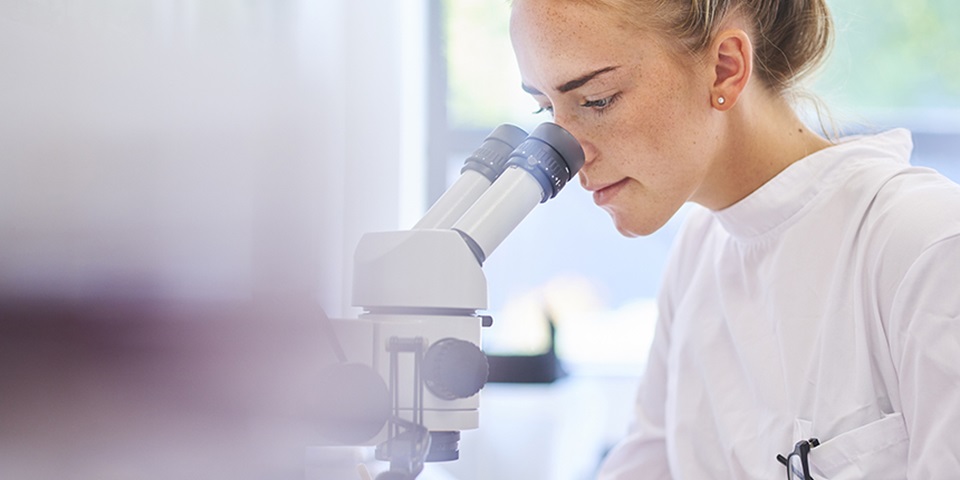Blog
What’s it like to work in laboratory medicine?

With the health sector growing rapidly there are many paths you can take to start your health career. But have you ever thought about exploring the world of laboratory medicine?
You could be involved in laboratory testing and analysis of clinical results, working in areas such as haematology, the study of the blood, immunology the study of the immune system, histopathology the study of disease in tissues, and molecular pathology the study of molecules. With stable growth predicted over the next five years, this fascinating and varied career provides a strong foundation for your future health career.
But what’s it really like to work in laboratory medicine and how do you get into it? To find out we spoke to Jasmine Ferguson, a recent graduate from Murdoch’s accredited Laboratory Medicine degree, who now works as a Microbiology Laboratory Assistant at Clinipath Pathology.
How did you get into the field of laboratory medicine?
It’s something I just sort of stumbled into really. I started at Murdoch in Molecular Biology and heard about their new laboratory medicine degree that offers practical experience and the opportunity was too good to pass up. As my degree went on, I developed a newfound love of haematology so it was an easy transition into laboratory medicine.
After my practicum experience, I was eager start my career and join the pathology industry. Before my final exams were over, I was already looking and applying for jobs in the pathology field. After a few applications, I was offered an interview at Clinipath Pathology and a couple of weeks later I had a new job!
What are the best bits about your job?
Initially, the appeal of my job was the hours, I work weeknights 4pm-12am and for someone who’s not a morning person it’s been awesome, I haven’t set an alarm in weeks!
But probably the best thing about my job is the camaraderie. The teamwork between staff is wonderful. At the end of the night, as individuals finish their own work and immediately go to help whatever bench is still going, there being up to 10 people finding a way to help and make sure we all go home at the same time when the work is over. Even on a later night when we’re processing past our scheduled finish time, we’re all in it together.
What are some of the challenges of your job?
Keeping consistent attention to detail and quality of work throughout the shift. The nights can be long and sometimes you might be doing the same action for 8+ hours. It’s easy to fall into a rhythm, but staying focussed is essential as of course behind every sample is a person, so it’s up to us to get them the results they need efficiently and accurately.
Playing into that is the challenge of keeping up with the fast pace of the lab. We process a large amount of samples every evening, accuracy is the most important thing, but getting the work done before the next day starts is also good!
What skills are needed to work in laboratory medicine?
Good communication skills are essential, the lab is usually busy so being able to coordinate effectively and efficiently with other staff members and departments saves a huge amount of time.
Consistency is also important. The same high-quality work and efficient pace has to be maintained for the whole night regardless of the time, so you’re pulling your weight in the team and giving the same quality of work at 4 pm as you do at 12 am. With that also comes good time management by keeping on top of your tasks throughout the night.
How did your university qualifications set you up to work in laboratory medicine?
As an assistant, the most valuable university experience was my practicum. It’s generally acknowledged in the workplace that staff with practical experience, prior to employment, pick up the role much faster than those with only in-class learning.
Even if the practical experience is in a different lab or area of pathology, simply having an understanding of the workflow of pathology work is essential. I spent a week in Microbiology during my practicum in a different lab and that was enough to show me the basic sample types, procedures and lab culture that made transitioning into my new job much less daunting.
Another aspect of using practicum to set myself up for my current job was building industry connections. Pathology in Perth is a small community so finding employment is made infinitely easier when you know the right people, having a professional in the field on your resume makes a huge difference.
The AIMS accreditation of the Laboratory Medicine degree at Murdoch is also helpful in finding employment as it shows that I’m able to work up to being a scientist, which is a better investment for employers than being capped at technician positions.
See for yourself how a Laboratory Medicine degree from Murdoch can kickstart your career.Blog
What’s it like to work in laboratory medicine?
Series
Posted on
Friday 15 January 2021